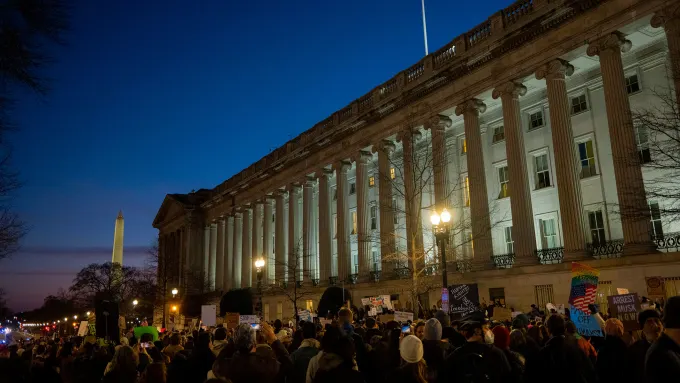Musk associates sought to use critical Treasury payment system to shut down USAID spending, emails show

Four days after Donald Trump’s inauguration, Elon Musk’s top lieutenants at the Treasury Department asked its acting secretary, a career civil servant, to immediately shut off all USAID payments using the department’s own ultra-sensitive payment processing system.
The ask was so out of line with how Treasury normally operates, it prompted a skeptical reply from David Lebryk, then serving as acting Treasury secretary, who said he did not believe “we have the legal authority to stop an authorized payment certified by an agency,” according to a source familiar with the exchange.
Lebryk suggested a “legally less risky approach” would be for the State Department, which oversees USAID, to rescind the payments itself and examine whether they complied with President Donald Trump’s Inauguration Day executive order freezing foreign development aid.
Tom Krause, a former tech executive and now the top DOGE staffer at Treasury, responded that Lebryk could have legal risk himself should he choose not to comply.
This back and forth over email, described to us by a source familiar with it, reveals the first known indication that Trump’s Department of Government Efficiency emissaries sought to use Treasury’s tools to block some payments, fulfilling the president’s political agenda.
The ensuing controversy set off a chain reaction around Washington this week, sparking a tense political debate and emergency court proceedings over DOGE’s access to the system and the administration’s potential interest in using it to turn off payments as it chooses.
The email exchange marked a direct collision between political appointees loyal to Musk and career civil servants at the Treasury Department.
Last Friday, Lebryk announced his sudden departure from government service, ending his more than 35-year career at Treasury.
Democratic senators on Capitol Hill have demanded answers, while unions and protesters voiced fears about Musk’s potential incursion into Americans’ private data.
The controversy has also drawn attention to a previously obscure office inside Treasury called the Bureau of the Fiscal Service, which processes more than a billion payments totaling more than a $5 trillion a year.
The Treasury payment system reliably distributes Americans’ tax returns, Social Security benefits, disability payments and federal employees’ salaries.
That action and access demanded by Krause is also dramatically different than the access the Treasury Department has since said he was eventually granted.
The Treasury Department, in a letter to lawmakers, said the access to the payment system granted to Krause and a deputy was restricted to “read-only” with the payments systems. Trump’s newly confirmed Treasury Secretary Scott Bessent delivered the same message in a private meeting with House Republicans on Monday.
But that level of access is dramatically different than what Krause and his DOGE associates had pressed Lebryk to grant in the email exchange — and came amid conflicting reports about whether the scope was more expansive than it was being conveyed.
“The hole here is what happened between the initial ask and Bessent’s sign-off,” said one source with knowledge of the events that led up to the email exchange. “Either the DOGE aspirations for what they wanted dramatically changed or the limitations they insist were placed on them aren’t the whole story.”
None of the people at Treasury on the emails responded to inquiries from us this week.
There have been questions about how far Trump and Musk believe they can go in cutting back spending across the federal government, with Musk in recent days commenting gleefully about shutting down payments.
The emails also highlight how forceful the group from DOGE has been in sketching out a way to use the Treasury Department to control grant funding Trump and Musk oppose, especially from USAID toward developing foreign nations.
Any decision to turn off some payments via Treasury’s systems, especially to align with Trump’s political wishes, would be an unprecedented fiscal decision and pose a direct threat to Congress’ power of the purse by giving the president more control over which payments to make, or not.
That wasn’t the Trump delegates’ approach, however.
![]()




